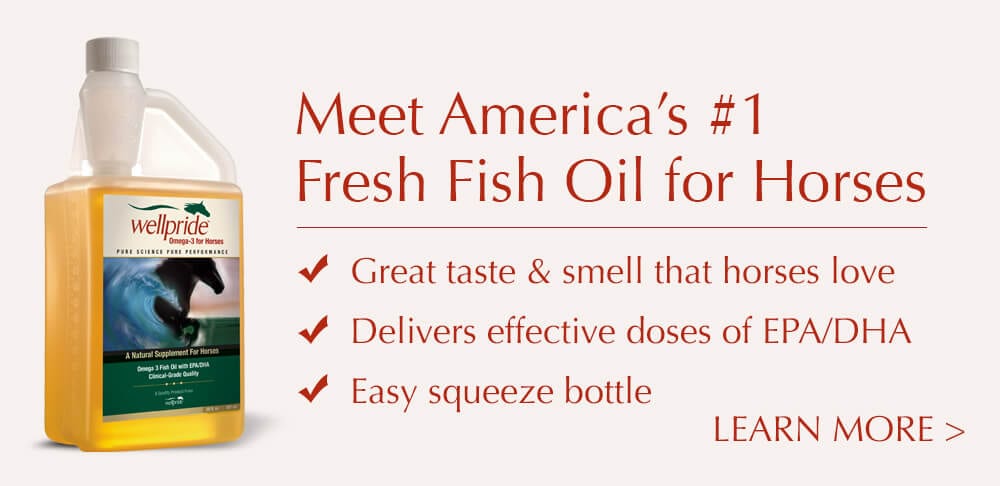Don’t Let Allergies Rub Your Horse the Wrong Way
Over the last decade, the American Veterinary Medical Association has seen a rise in allergies. As recently as February 2020, its news article, ‘More Itchy Pets?’ cited a report that found environmental allergies increased by 30.7% in dogs and 11.5% in cats between 2008 and 2017 [1].
While there has yet to be concurrent research published on equines, Dr. Anne-Marie Chalmers, co-founder of Wellpride omega-3 supplements for horses, has spoken with enough owners to hear how allergies have been rubbing their animals the wrong way, too.
What Triggers Equine Allergies?
According to the American College of Allergy, Asthma and Immunology, warmer temperatures and milder winters brought about by climate change are increasing pollen counts and making allergy seasons last longer [2].
Allergic reactions occur when a horse’s immune system goes into overdrive. Allergies can trigger when a horse is exposed to pollen from forages like alfalfa and Bermuda grass.
Common food allergies can also include such unexpected surprises as apples, beet pulp, bran, buckwheat, chicory, clover, cocklebur, corn, flax, lucerne, malt, molasses, oats, potatoes, ragweed, soy, and St. John’s Wort.
Choosing an Omega-3 Supplement for an Allergic Horse
Omega-3 supplements are often recommended for horses (and other animals) suffering from dermal and respiratory allergies. Studies indicate that omega-3s have anti-inflammatory properties that may dampen the allergic response [3].
However, not all omega-3 sources are alike.
“A lot of customers come to us with horses allergic to soy, cottonseed, flaxseed, and more,” says Dr. Chalmers. “These kinds of oils can oftentimes be mixed in with equine omega-3 supplements.”
In 2003, Wellpride became the first commercial equine fish oil on the market for horses. The supplement contains only fish oil, natural flavoring, and a little bit of vitamin E, without other additives.
“We probably don’t really talk about this enough. Wellpride does not have any of the common equine allergens,” says Dr. Chalmers. “Wellpride provides a pure source of fat, so it doesn’t contain any protein. That’s important since allergies are triggered by proteins or glycoproteins.”
“A lot of customers come to us with horses allergic to soy, cottonseed, flaxseed, and more. These kinds of ingredients can oftentimes be mixed in with equine omega-3 supplements.”
Respiratory Allergy Issues
The most common allergic reactions are hives and itching, but can also include respiratory issues such as equine asthma.
Laurent Couëtil, professor of large animal internal medicine at Purdue College School of Veterinary Medicine, said the causes are largely environmental. In a September 2020 Purdue University article, he stated, “We see an increase in horses showing signs of equine asthma during crop harvest season. Horses pastured near fields where crops are harvested may be exposed to dust generated by a combine while harvesting crops.”
“Horses with asthma tend to show signs when pollen and molds peak in the fall,” he said, adding that one reason for flare-ups has to do with feeding.
As grass becomes sparse toward the end of the season and horses are supplemented with dry hay, more may develop flare-ups, as most asthmatic horses are allergic to hay dust. Less severe asthma symptoms can improve when horses are put on grass pasture, but during the fall or winter, this isn’t always possible.
Research, he says, continues to demonstrate that athletic and competitive horses benefit from supplementation rich in omega-3 fatty acids, like the EPA and DHA found in fish oil and algae [4].
Avoiding exposure to allergic triggers, by feeding an anti-inflammatory omega-3 supplement like Wellpride fish oil for horses, can help owners keep their horses in tip-top shape and perform at their peak levels.
Find more frequently asked questions (and answers) about feeding fish oil supplements here.
References:
- Burns, K. (2020). “More Itchy Pets? No Problem”. JAVMA News, American Veterinary Medical Association.
- (2021). “Does More Pollen Mean Worse Allergy Symptoms? Probably”. ACAAI.org.
- Miyata, J. & Arita, M. (2015). “Role of Omega-3 Fatty Acids and Their Metabolites in Asthma and Allergic Diseases”. Allergology International, 64 (1), 27 – 34.
- Lefever, K. S. (2020). “Fall Allergies Can Trigger Horses’ Asthma, Impact Performance”. EVPRP Research Articles, Purdue University.







Comments (1)
Thank you for all you do. What a tricky situation it would be without your product to help my Equine customers get the Anti-inflammation benefits of omega threes when they are actually allergic to flaxseed and other traditional sources of a Megas! Thank you for your product